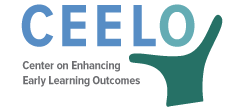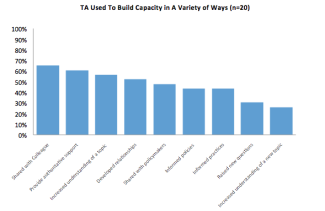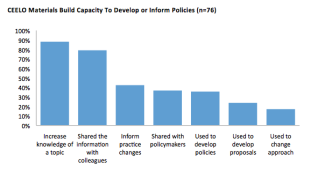
Building the capacity of state early childhood administrators
CEELO FY2015
February 10, 2016

At CEELO we believe all organizations benefit from a continuous improvement process based on evaluation. That’s why we’re not only engaged in providing Technical Assistance (TA) to states across the country, but we also evaluate our own work and act upon feedback to enhance our services and outreach.
The Center on Enhancing Early Learning Outcomes (CEELO) is one of 22 comprehensive centers funded by the U.S. Department of Education, Office of Elementary and Secondary Programs. CEELO is designed to increase the capacity of State Education Agencies (SEAs) to implement comprehensive and aligned early learning systems to increase the number of children from birth through third grade that are prepared to succeed in school. The Annual Report, a requirement of our funding annually, outlines the impact of the technical assistance provided in the third year of the 5 years of the project. Between October 1, 2014 and September 30, 2015 CEELO provided three types of technical assistance: (1) Responsive TA; (2) Strategic TA; and (3) Information Resources and Technology Supported TA.
I. Responsive Technical Assistance to States: CEELO provides targeted support and consultation to states to address policy issues impacting children birth through third grade.

The Range of TA Provided by CEELO in Year Three
General: CEELO co-developed a national webinar on NAESP P-3 standards and the role of state education agencies in supporting principal leadership to implement a Birth to Third Grade framework. It was designed as a follow-up to a summer 2014 introduction by NAESP that was requested by NAECS-SDE members. Follow- up evaluations were favorable: one individual reported that it was “outstanding in every way! Your experience and expertise in the field comes through loud and clear in the content and delivery of these webinars. Thank you!" Another reported that the webinar provided “deep and detailed information.”
Targeted. In May and July 2015, CEELO held meetings of early childhood specialists from Northeast state departments of education for two separate in-person meetings in Waltham, MA. The first meeting focused on PDG start-up activities and provided participants with an opportunity to network and learn from one another about promising practices and challenges in early implementation. The second meeting, held in collaboration with the Regional Education Lab- Northeast and Islands (RELNEI), focused on Kindergarten Entry Assessment design and implementation. Participants had opportunities to hear from researchers’ key findings from selected states and engage in conversations about how to address common design and implementation challenges. Participants requested ongoing follow up conversations with one another. As a result, CEELO has facilitated monthly peer exchange calls among state specialists in the Northeast. The meetings were favorably evaluated. One respondent reported, “person-to-person consultation has been helpful to a very large degree.” Another stated, “I loved meeting all the folks from the New England states.”
Intensive: CEELO supported the development of Nevada’s Office of Early Learning strategic plan. Beginning in Year 2 and continuing in Year 3, through a series of intensive meetings, the CEELO co-director convened key stakeholders who articulated the vision for the new office, developed a strategic plan, and crafted an operational plan that has guided ongoing operations for the new office. Direct results include improved internal and external communications, and staffing plans and professional development plans for new office staff. One key informant noted that the CEELO TA provider “was fabulous in helping prepare, organize and facilitate our strategic planning meeting for our new Office of Early Learning and Development in the Nevada Department of Education. It was very helpful to have someone with outside expertise and such great experience working with other states help us think through the planning and organizing of our new office to hopefully help shape and provide guidance to our agency leadership, restructuring and organizing of our office.”
II. Strategic TA: CEELO engages in multiple efforts supporting all 50 states and territories in sustained initiatives addressing CEELO’s five focus areas. All activities are designed to build capacity and promote SEA policy and leadership development.

Selected Examples of Strategic TA
Building Leadership Skills of Early Childhood Administrators: During Year 3, the first cohort of the Leadership Academy was implemented. The Fellows met 4 times, engaged with their coaches, and completed their Job Embedded Projects.
During the final months of Year 3, CEELO prepared for the second cohort, offering applications and selecting Fellows who will engage in the Leadership Academy during Year 4. For in-depth information on the design and structure, as well as participant feedback, see State Early Education Leadership Academy: Report on Year 1, 2014-2015 as well as the online Leadership Academy Page.
CEELO, in collaboration with the BUILD initiative, conducted the first cohort of the Learning Table in CEELO Year 3. A report documenting state policies to promote effective teaching and learning was produced.
CEELO will continue to support the Think Tank with a second cohort in CEELO Year 4.
Building Capacity of States to Access Research and Best Practice: The 2015 National Roundtable was successfully held, focused on the theme of “Leading for Excellence”. Of the 150 attendees, 41 state agencies were represented by 88 attendees with 25 states bringing a team.
Building Capacity to Access Research and Information to Inform Policy: CEELO sponsored or co-sponsored 13 webinars CEELO TA staff also presented at 18 national and regional meetings sponsored by other organizations on topics of relevance to SEAs and CEELO priorities.
Building Capacity of Preschool Development Grantees-Expansion States to implement a high quality preschool program. CEELO provided TA on 23 requests for support on PDG-related topics. These are described in the responsive technical assistance portion of the full report, with links to relevant resources. CEELO also convened PDG staff from multiple states in 3 peer exchanges in 2015.
III. Information Resources: CEELO produces numerous publications aimed at encouraging best practices and enhancing child outcomes.

CEELO responded to 100% of the 50 information requests made across the range of CEELO priority topics. Requesters were interested in both research around the topic and information on how other states were addressing critical questions related to our core objectives, including assessment, workforce, systems, data, and birth to third grade. CEELO develops different types of resources including Policy Briefs, Fast Facts, Annotated Bibliographies, and Tools. Selected examples are outlined below, along with links to resources developed from those queries:
- Bachelor’s degree requirements for pre-K lead teachers
- Funding (e.g., funding formulas for per-student expenditures, funding formulas for pre-K)
- Child assessment
- Research on high quality pre-K and child outcomes
- Retention
- Teacher evaluation and student growth objectives
- Quality Rating and Improvement Systems
IV. Data on Impact of CEELO TA: Building capacity in SEAs is a primary and important aim of the TA CEELO provides. CEELO surveyed SEA staff and asked about the ways in which the TA has affected SEA capacity. Survey results reveal that respondents were most likely to report using the TA to share ideas and lessons learned with colleagues, provide authoritative support to advance their SEA work, increase an understanding of a topic, and develop relationships. Many used the TA provided in multiple ways.


CEELO TA to a State in Transition
What CEELO Did: Coordinating closely with the liaison from the Northeast Comprehensive Center, CEELO provided technical assistance to support the development of a strategic plan to implement a system of professional development for early childhood educators in one state. CEELO facilitated a full-day meeting comprising stakeholders from state agencies, regional offices within the state, and professional development providers.
Shortly after the meeting, the newly elected governor placed restrictions on state spending, offered early retirement options for state employees, and changed strategic direction for early education in the state. To respond to these changes, the state education agency asked CEELO to meet with a team of state staff to translate the strategic plan into an operational plan that could provide a useful guide for state work for the upcoming year.
How the Assistance Impacted the State: Independent evaluations reveal that stakeholders reported the assistance helped with longer-term planning and provided state employees with needed support during a time of staffing challenges. One individual who participated in the longer-term strategic planning process, as well as the process of developing an operational plan, reported that CEELO, “Facilitated discussion of relevant issues and resulted in concrete action.” Another comment was, “I really appreciated the paper on research of best practices — this is something I have been wanting since we cannot use our grant funds to travel out of state to conferences. The session seemed responsive to the needs we verbalized at our meetings.”
What Challenges and Issues Exist for the State: As the state seeks to implement the strategic plan to support the creation of a system of tiered professional development supports for early education teachers, the state education agency will continue to work with CEELO to implement the existing plan. The state education agency has asked CEELO to provide TA in Year 4 to ensure courses offered are aligned with the state’s broader education goals. Specifically, the state is seeking to support the effective implementation of formative and summative assessments and is in the process of implementing a B-3rd Grade framework of supports. The SEA is eager to align the professional development strategic plan with ongoing work on assessment and the state’s B-3rd Grade framework so that educators can easily see how these activities are aligned, rather than viewing each separately.
Conclusion and Recommendations

As designed, the annual evaluation has identified a few areas for improvement and continued focus of TA delivery and relationship building between CEELO TA liaisons, State administrators, and Comprehensive Center staff in Year 4. These are:
- Expand opportunities for states to learn from one another and tailor experiences to meet participants’ needs.
- Provide information in formats that can be directly used to inform policy and procedure.
- Engage state personnel in designing strategic technical assistance.
- Proactively lead state education agencies in advancing an early learning agenda.
Please see the Annual Report section of our website for the full report from Year 3 and previous years and explore the CEELO website and for more information on our ongoing technical assistance and resources.
About NIEER
The National Institute for Early Education Research (NIEER) at the Graduate School of Education, Rutgers University, New Brunswick, NJ, conducts and disseminates independent research and analysis to inform early childhood education policy.
